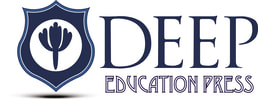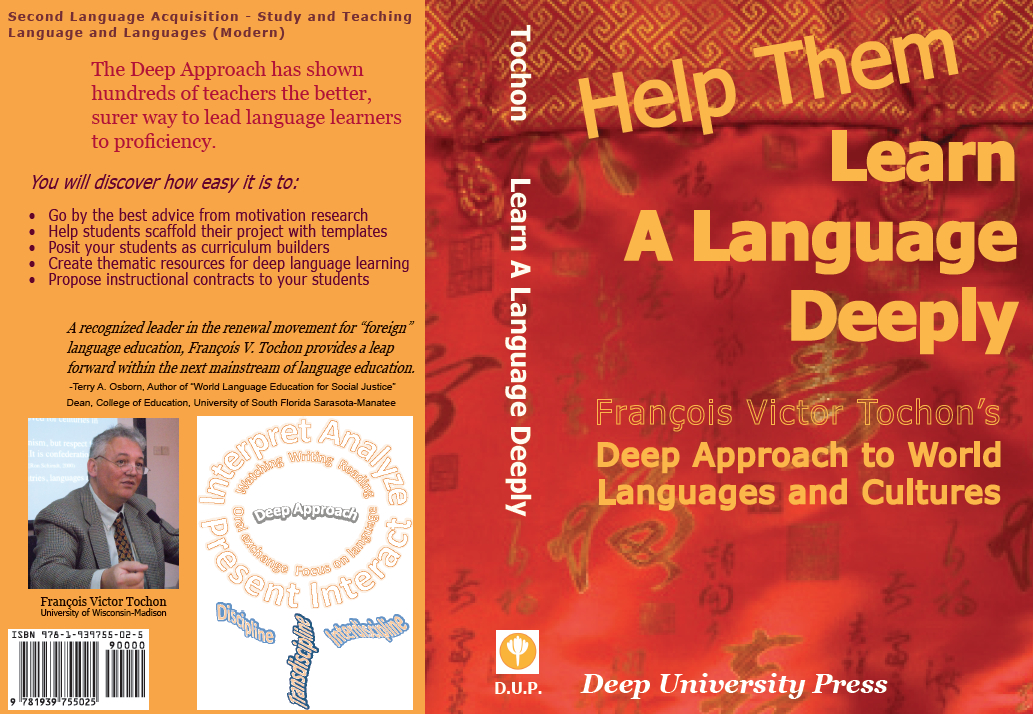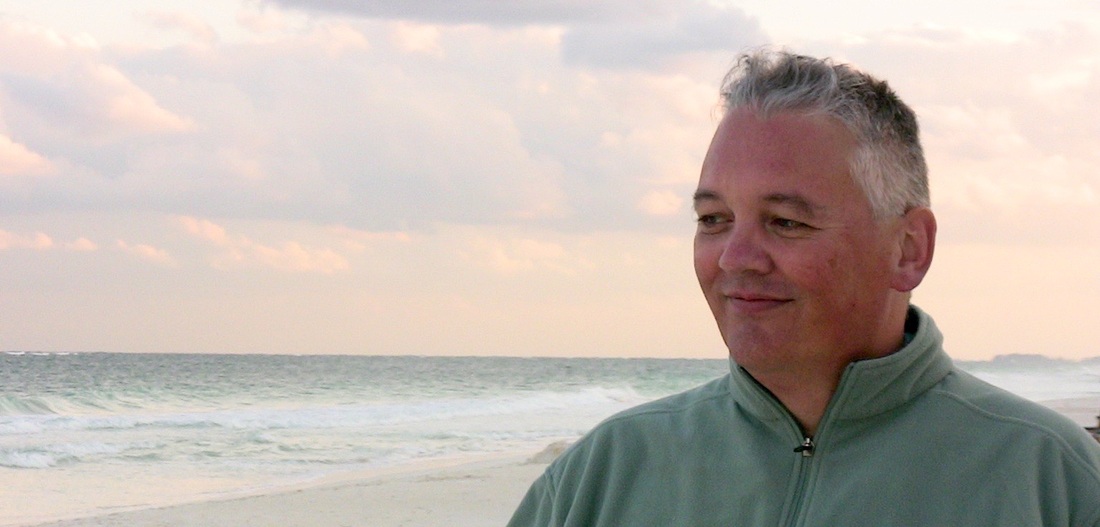Help Them Learn a Language Deeply!
Tochon's Deep Approach to World Language and Cultures
Francois Victor Tochon
|
Your browser does not support viewing this document. Click here to download the document.
François Tochon, a recognized leader in the renewal movement for “foreign” language education in the United States and beyond, provides a leap forward within the next mainstream of language education. His proposal of a self-determined apprenticeship of language learning recognizes the interface between government policies and classroom practices that has long been ignored in the field, to the detriment of the disenfranchised. Practitioners and scholars alike can benefit from the vision he brings, even as our field begins to benefit all of society in meaningful ways.
Terry A. Osborn, Author of “World Language Education for Social Justice”, Dean, College of Education, University of South Florida Sarasota-Manatee |
BEST SELLER
|
|
The advocates for an effective U.S. policy for teaching and learning world languages could benefit from reading this critical contribution. Tochon's conceptualization of a "deep approach" is both timely and profoundly better for preparing learners for the globally interconnected realities they live now. Tochon provides viable options that show authentic language learning is profoundly connected to shaping thinking and social actions, as well as to further language and literacy learning. No longer can world language education be confined to merely a show of empty linguistic performances, rather needs to directed more towards building performances that truly put language to work on addressing sociocultural realities, forging ahead in the spirit of Dewey, Vygotsky, & Freire.
Theresa Austin, Professor, Author of “Content-Based Second Language Teaching and Learning”, School of Education, University of Massachusetts, Amherst François Tochon’s new book, Help Them Learn a Language Deeply!, is at once brilliant and humble. Tochon’s humility enables him to transcend the arrogance that has traditionally permeated foreign language literature studies and relegated foreign language teaching to a sub-disciplinary status in the academy. Tochon’s humility allows him to transcend the arrogance of disciplinary rigidity and status hierarchies while unabashedly embracing an interdisciplinary approach to language analysis and teaching that factor in cross-cultural variables. He convincingly argues for “methodologies associated with language arts and first language literacy [that] must now be integrated into the second/foreign language classroom for a deeper, integrated apprenticeship of languages and cultures. What makes Help Them Learn a Language Deeply! unique is the author’s profound understanding of culture that goes beyond the elitist and often reductionist view of culture that, with rare exception, continues to dominate literary studies and to reproduce dominant values throughout the field of foreign language education.
Donaldo Macedo, Author of “Literacies of power: What Americans are not allowed to know”, Chair, Department of Applied Linguistics, University of Massachusetts, Boston |
I am often asked by Chinese students why their efforts and the time they have spent studying English have not given them the results they expected. As an English teacher, I have been frustrated by my lack of a satisfactory answer until I met Dr. Francois Tochon. Now I have the answer: Deep Approach. The conception of a self-determined apprenticeship in languages is a revolution against traditional language teaching methodology, which merely views a second language as a boring academic subject instead of a pleasant practical skill.
Gao Mingle, Director, English Education Center, Center for Linguistic Theory, and China Association of Language and Education, Beijing Language and Cultures University, China Tochon’s conceptualization of the deep approach to the study of world languages, unlike most changes in foreign language education, is not simply a change in approach or methodology. It is far more fundamental than this – it is, indeed, a paradigm shift, that requires us to rethink virtually everything that we assume about the teaching and learning of languages. It is also one of the most exciting, creative and powerful ideas to emerge in our field in decades, and creates incredible opportunities for all of us. Timothy Reagan, Author of “Language, Education, and Ideology” and “The Foreign Language Educator in Society” (with T. Osborn), Professor and Dean of the College of Education at Zayed University in Abu Dhabi/Dubai, Saudi Arabia In order to communicate genuinely with most others and benefit from alternative ways of viewing the world, we need to learn languages. François Tochon describes the richness of language learning, how language is woven into culture, values and action. Even better, he provides a clear and systematic approach to deep language learning. Language learners and teachers will benefit greatly from this book. Stanton Wortham, Author of “Learning Identity: The Joint Emergence of Social Identification and Academic Learning”, Associate Dean, University of Pennsylvania François Victor Tochon has written an extremely important book. His Deep Approach to language learning / teaching provides the basis for developing a revolution in the teaching of second or foreign languages. His book sets forth the theoretical foundation for the deep learning approach, solid evidence that shows that the deep learning approach works, and most important practical and understandable guidelines on how to implement deep language learning. It is also consistent with Kurt Lewin’s five-stage action-learning framework. The book is valuable for those in the language field but also for general readers who want to gain an introduction and overview of the field. Bertha Du-Babcock, Department of English for Business, City University of Hong Kong, China I find F. V. Tochon's book innovative and progressive, as well as original in the field of motivation and language learning. The proposed techniques and strategies enhance and stimulate effective learning; they are a great contribution to the complex field of motivation. I am sure that it will be welcome among educators and useful for language teachers and learners. Congratulations on the achievement! Daniel Madrid, Chief Editor of Porta Linguarum, Faculty of Education, University of Granada, Spain |
|
Tochon makes a powerful case for dynamic language learning. His lively, visionary book explains how reproductive, boring approaches can be replaced by empowering processes for teachers and learners. Tochon’s writing embodies the reflective, interactive learning that he advocates and charts so lucidly.
Robert Phillipson, Author of “Linguistic Imperialism” and “English-Only Europe?”, Copenhagen Business School, Denmark As a language research, teacher, learner, and user, I realize the value of Professor Tochon's work and the improvement it will bring to language education. The Deep Approach will change the relationship between teachers and students as they become real partners, sharing in the fun while progressing through language learning. Let's start an adventure of language learning and get to know the world better! Ronghui Zhao, Chief editor of the book series “Foreign Language Strategy Studies”, Director, Institute of Linguistic Studies, Shanghai International Studies University The Deep Approach is a new way to understand the World of languages; the learner is key as the engine to get motivated through the role played individually and with other peers as well as being an active part in the design of the Curriculum. The Deep Approach fosters a critical attitude in learners that has been consigned to oblivion for many years and that will provoke a change in the vision of key aspects such as culture, human rights or social justice. We lecturers do need to get immersed in this new and Deep Approach. José Luis Ortega-Martin, Professor, Director of In-Service Training, Foreign Language Education, University of Granada, Spain |
In his latest book, Help Them Learn a Language Deeply: The Deep Approach to World Languages and Cultures, Professor Francois V. Tochon once again provides practicing language teachers, and, indeed, the profession-at-large, invaluable perspectives on the nature of the language learning process and beyond. In articulating the Deep Approach, it reflects the powerful dynamic potential that mastering language and cultivating cultural understanding represent to the world today, namely the hopeful prospect of "what a self-determined apprenticeship of languages could change in terms of the resources we provide to students, the way we consider evaluation, proficiency, and the role our discipline can play for internationalizing the mind and building peace" -- an aspiration truly to be pursued with energy, resourcefulness and commitment.
Gina Lewandowski, Middle School Teacher of French Spanish and ESL, Madison Metropolitan School District, Wisconsin, USA Acquisition of language skills occurs when students proactively learn the target language through appropriate and adequate facilitation by their teachers. The Deep Approach, as applied in this book, enables teachers and students to flexibly and meaningfully collaborate on language learning tasks, which will lead to the acquisition of language. This book shows clearly how language teachers can approach their instruction through the framework illustrated in this book. I would like to thank Professor Tochon for publishing this outstanding book, which is sure to revolutionize language instruction in the coming years. Yuanshan Chuang, Director of Netpaw and APAMALL, Kun Shan University, Taiwan, ROC |
|
François Tochon defines a practical approach to language pedagogy that includes but goes beyond the acquisition of knowledge and skills. The Deep Approach provides an access to the heart of learning that nurtures global value to celebrate the diversity of cultures. Meanwhile, it establishes a framework of action to situate language learning in transdisciplinary cultural contexts.
Zongjie Wu, Professor, Zhejiang University, China As teachers and learners of languages we attend to language but we ignore what lies beyond—a complex of physical, spatial, interactional, institutional, political, and historical contexts that are present at every communicative moment. In deep learning, learners break free from such a narrow focus on language to develop skills that allow the creation of meanings in many different semiotic modalities that are embedded in context. Richard F. Young, Author of “Discursive Practice in Language Learning and Teaching”, Professor, Department of English, University of Wisconsin-Madison, USA
|
Language learning in the contemporary era is complex, globally situated, and mediated by a wide array of fluid social practices, hybrid cultural environments, and emerging communicative modalities. Tochon’s incisively argued volume acknowledges all of this and does a number of things very well: It highlights opportunities for the articulation of agency, is sophisticated in its treatment of culture and motivation, and relativizes historically constructed barriers between first and additional language learning. This book is innovative, insightful and an invaluable resource for students and teachers engaged in any aspect of language learning and teaching, applied linguistics, and world languages education.
Steven L. Thorne, Department of World Languages and Literatures, Portland State University (USA), and Department of Applied Linguistics, University of Groningen (Netherlands) |







